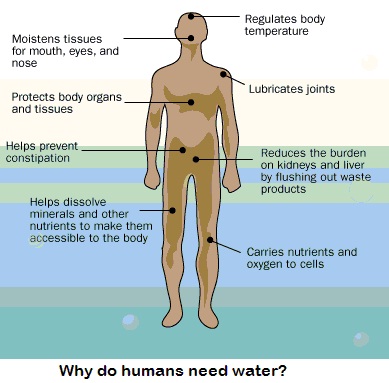|
|
|
|
 Our
bodies are about 60 percent water. Water regulates our body temperature,
moves nutrients through our cells, keeps our mucous membranes moist and
flushes waste from our bodies. Our lungs are 90 percent water, our
brains are 70 percent water and our blood is more than 80 percent water.
Simply put, we can't function without it. Most people sweat out about
two cups of water per day (0.5 liters). Each day, we also lose a little
more than a cup of water (237 ml) when we exhale it, and we eliminate
about six cups (1.4 l) of it. We also lose electrolytes -- minerals like
sodium and potassium that regulate the body's fluids. So how do we
replace it? Our
bodies are about 60 percent water. Water regulates our body temperature,
moves nutrients through our cells, keeps our mucous membranes moist and
flushes waste from our bodies. Our lungs are 90 percent water, our
brains are 70 percent water and our blood is more than 80 percent water.
Simply put, we can't function without it. Most people sweat out about
two cups of water per day (0.5 liters). Each day, we also lose a little
more than a cup of water (237 ml) when we exhale it, and we eliminate
about six cups (1.4 l) of it. We also lose electrolytes -- minerals like
sodium and potassium that regulate the body's fluids. So how do we
replace it?
We can get about 20 percent of the water we need through the food we
eat. Some foods, like watermelon, are nearly 100 percent water. Although
the amount of water that we need each day varies, it's usually about
eight cups (2 l). But instead of worrying about getting in those eight
cups, you should just drink when you start to feel thirsty. You can get
your water by drinking other beverages -- but some beverages, like
alcohol, can make you more dehydrated.
If your urine is dark yellow, you might not be drinking enough water. Of
course, you need more water when you're exercising; ill with diarrhea,
vomiting or fever; or in a hot environment for a long time. Most people
can survive only a few days without water, although it depends on a
number of factors, including their health and environment. Some have
gone as long as two weeks. Followers of a Buddhist boy meditating in
Nepal claim that he has gone two years without food or water, but
doctors have not been able to substantiate this.
When you don't get enough water, or lose too much water, you become
dehydrated. Signs of mild dehydration include dry mouth, excessive
thirst, dizziness, lightheadedness and weakness. If people don't get
fluids at this point, they can experience severe dehydration, which can
cause convulsions, rapid breathing, a weak pulse, loose skin and sunken
eyes. Ultimately, dehydration can lead to heart failure and death.
Dehydration caused by diarrhea is a major cause of death in undeveloped
countries. Nearly 2 million people, mostly children, die from it each
year [source: WHO]. Consuming water polluted with biological
contaminants and not having access to adequate sanitary facilities can
lead to diseases like malaria and cholera and parasites like
cryptosporidiosis and schistosomiasis. Water can be also be contaminated
with chemicals, pesticides and other naturally occurring substances.

Source: http://science.howstuffworks.com |
|


 Our
bodies are about 60 percent water. Water regulates our body temperature,
moves nutrients through our cells, keeps our mucous membranes moist and
flushes waste from our bodies. Our lungs are 90 percent water, our
brains are 70 percent water and our blood is more than 80 percent water.
Simply put, we can't function without it. Most people sweat out about
two cups of water per day (0.5 liters). Each day, we also lose a little
more than a cup of water (237 ml) when we exhale it, and we eliminate
about six cups (1.4 l) of it. We also lose electrolytes -- minerals like
sodium and potassium that regulate the body's fluids. So how do we
replace it?
Our
bodies are about 60 percent water. Water regulates our body temperature,
moves nutrients through our cells, keeps our mucous membranes moist and
flushes waste from our bodies. Our lungs are 90 percent water, our
brains are 70 percent water and our blood is more than 80 percent water.
Simply put, we can't function without it. Most people sweat out about
two cups of water per day (0.5 liters). Each day, we also lose a little
more than a cup of water (237 ml) when we exhale it, and we eliminate
about six cups (1.4 l) of it. We also lose electrolytes -- minerals like
sodium and potassium that regulate the body's fluids. So how do we
replace it?